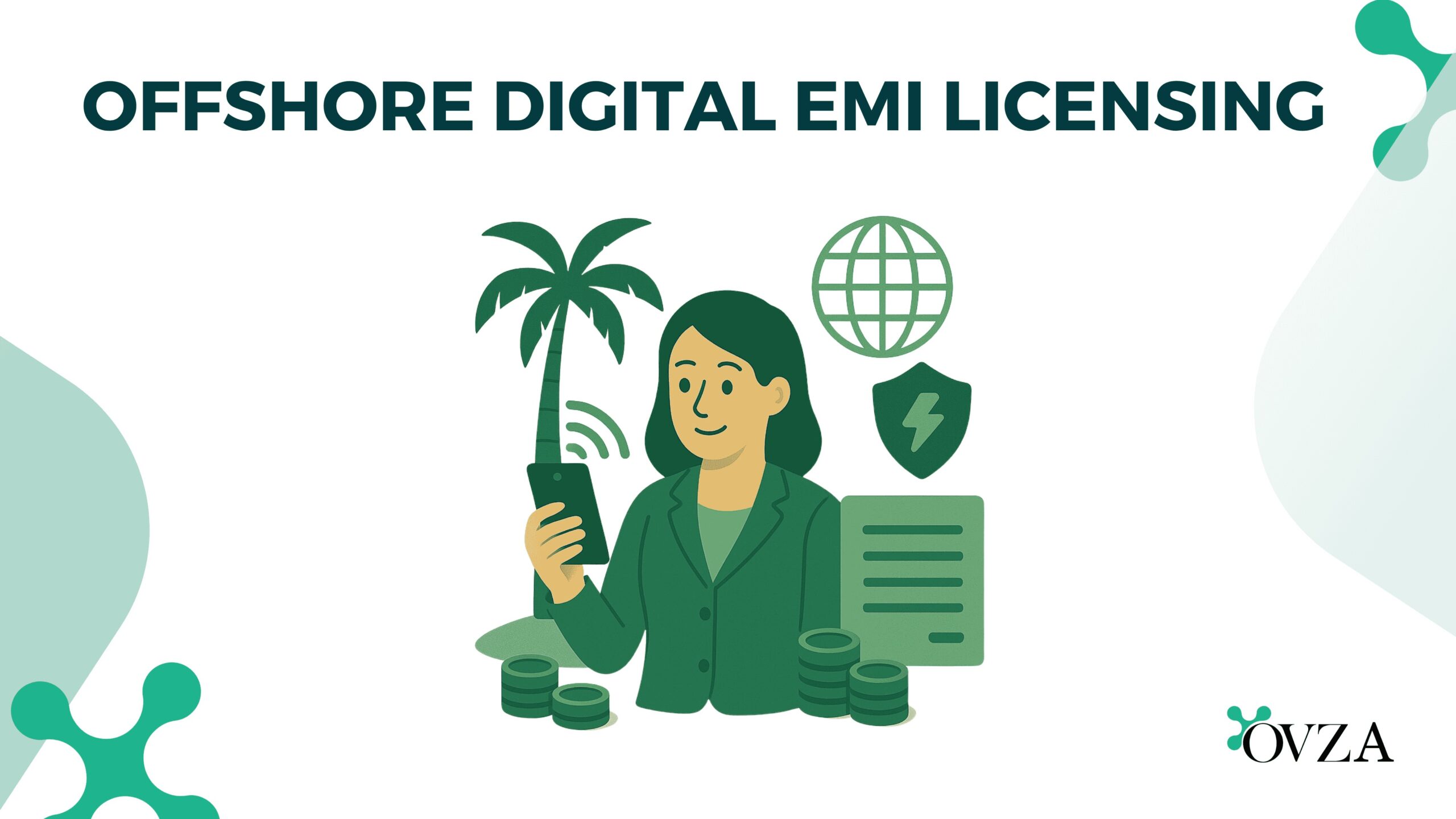Offshore digital EMI licenses require AML compliance, operational substance, and legal structuring aligned with cross-border financial regulations. A properly structured offshore Electronic Money Institution (EMI) license enables non-bank financial service providers to legally issue electronic money and facilitate digital payments across borders. These licenses, offered by select offshore jurisdictions, provide a regulated framework for fintech firms seeking operational flexibility outside traditional banking regimes. However, the legal validity of such structures depends on compliance with anti-money laundering laws, capital safeguards, and supervisory standards that align with international financial regulations.
Legal Foundations and Regulatory Divergence
The licensing of Electronic Money Institutions (EMIs) in offshore jurisdictions has emerged as a specialized domain within international financial services regulation. A digital EMI license authorizes the issuance of electronic money and the provision of digital payment services, often encompassing cross-border fund transfers, prepaid cards, and virtual accounts. Offshore EMI structures are increasingly sought after by fintech entities, neobanks, and payment aggregators seeking regulatory flexibility, international customer onboarding, and reduced compliance burdens. However, the legal viability of these structures is predicated on strict adherence to anti-money laundering (AML) rules, capital adequacy standards, and cross-jurisdictional supervisory obligations.
While EU-based EMIs are regulated under the Electronic Money Directive (2009/110/EC) and the PSD2 framework, offshore licensing regimes diverge substantially. Jurisdictions such as Mauritius, Labuan (Malaysia), Puerto Rico, and certain Eastern Caribbean states have developed bespoke frameworks allowing for the incorporation and regulation of EMIs under national financial services laws. These regimes often fall outside the EU passporting system but still adhere to FATF standards and increasingly adopt Basel Committee principles on operational resilience and capital safeguards.
The decision to seek offshore EMI licensing is often based on the strategic objective of achieving legal personhood in a jurisdiction that permits operational flexibility across digital asset classes, including stablecoins and prepaid digital tokens. However, obtaining such a license does not in itself confer access to international correspondent banking or card network integration. Applicants must separately secure sponsorships from banking or acquiring partners, often in jurisdictions where de-risking policies impose enhanced due diligence for offshore financial entities. As a result, the legal architecture of an offshore EMI must be designed to demonstrate transparency, regulatory substance, and verifiable AML frameworks.
Moreover, the proliferation of digital EMIs in lightly regulated offshore jurisdictions has attracted heightened scrutiny from global supervisory bodies and has prompted the adoption of enhanced licensing thresholds, including minimum capital requirements, board composition criteria, and technological safeguards. These compliance expectations are generally assessed during the license application process and remain subject to post-licensing audit and supervision. The growing alignment between offshore and onshore EMI regimes reflects a convergence in regulatory expectations even where legislative models differ.
Licensing Procedure, Substance Criteria, and Cross-Border Supervision
The licensing procedure for offshore Electronic Money Institutions generally involves a multi-stage regulatory application, including business model disclosure, ownership vetting, AML policy submission, and the designation of a compliance officer. Offshore regulators such as the Financial Services Commission of Mauritius and the Labuan Financial Services Authority typically require a detailed operations manual, including risk management systems, transaction monitoring protocols, and client onboarding procedures. These requirements are consistent with the FATF Recommendations, particularly Recommendation 10 on customer due diligence and Recommendation 15 concerning new technologies.
Substance requirements are a key determinant of regulatory credibility in offshore EMI licensing. Regulatory authorities have become increasingly unwilling to approve shell entities or nominee-director structures lacking demonstrable business activity in the jurisdiction of incorporation. In Mauritius, for example, an applicant for a digital EMI license must maintain a management presence, employ qualified local staff, and establish technical systems that are accessible for regulatory audit. These conditions are enforced through ongoing supervision and periodic inspections under the FSC’s Risk-Based Supervision Framework.
The regulatory distinction between an EMI and a traditional financial institution lies in the functional treatment of client funds. Electronic money is not a deposit under banking law and does not confer interest or profit entitlement. As a result, EMIs are exempt from certain banking-specific regulations but remain subject to client fund safeguarding and insolvency segregation requirements. Offshore EMI frameworks reflect this distinction by mandating trust or custodial arrangements for the holding of client balances and requiring reconciliation between issued e-money and segregated assets.
Cross-border supervision poses unique legal challenges for offshore EMIs. Although an EMI may operate from a jurisdiction with formal regulatory oversight, its clients are often located globally. This creates potential legal exposure under the domestic financial services laws of the user’s country of residence. Jurisdictions such as the European Union, Canada, and the United States maintain extraterritorial regulatory authority over financial services offered to their residents, which may trigger licensing, registration, or enforcement actions against offshore providers that serve users in those regions without proper authorization. As such, EMI licensees must structure their digital service delivery model to avoid legal nexus with prohibited markets or to meet threshold exemption requirements.
The application of fintech licensing in offshore structures is further complicated by the inclusion of digital wallets, peer-to-peer transfer systems, and integrations with blockchain platforms. Some offshore jurisdictions permit EMI license holders to engage in ancillary virtual asset services, provided these are disclosed and authorized under the scope of their license. However, such integrations often raise new supervisory concerns relating to cybersecurity, consumer protection, and transaction traceability, which must be addressed during the license application process. In many cases, offshore EMI operators also seek legal opinions affirming compliance with applicable data protection and anti-terrorism finance laws.
Legal practitioners involved in offshore EMI licensing are increasingly required to draft compliance memoranda that align with not only local statutes but also supranational obligations, including OECD CRS reporting and EU blacklisting criteria. The overlap between offshore licensing and international information exchange frameworks has led to stricter onboarding requirements, including ultimate beneficial ownership disclosure, source of funds verification, and enhanced due diligence for politically exposed persons.
Market Access, Revocation Risks, and Legal Viability
The legal sustainability of offshore digital EMI structures ultimately hinges on whether the licensing framework supports not just regulatory approval, but operational continuity and market access. A license that enables the issuance of electronic money must be complemented by correspondent arrangements with payment networks, currency exchange providers, and acquiring institutions. Many offshore EMIs struggle to access global banking infrastructure due to de-risking practices imposed by upstream institutions wary of regulatory exposure. This has led to the development of alternative banking models, including the use of digital custodians, third-party payment processors, and integration with regulated virtual asset service providers.
Another core risk in the offshore EMI space is license revocation, which may result from regulatory breaches, noncompliance with reporting requirements, or failure to maintain operational substance. Regulators typically reserve the right to suspend or cancel licenses where licensees cease activity, alter their business model without approval, or fail to comply with statutory audits. The revocation of an EMI license often has extraterritorial consequences, including cross-listing on sanctions watchlists and termination of third-party service agreements. License holders must therefore treat regulatory compliance as an ongoing obligation and not merely a condition precedent to obtaining initial authorization.
Legal advisory in this field must address both jurisdiction-specific legislation and applicable international norms. Jurisdictions that lack statutory clarity or rely on discretionary licensing may expose EMI operators to administrative uncertainty and reputational risk. Conversely, offshore jurisdictions that adopt transparent licensing criteria, judicially reviewable processes, and independent regulatory oversight offer stronger legal foundations for long-term digital financial operations. The legal enforceability of contracts, access to dispute resolution, and protection of client funds in insolvency must be assessed prior to selecting a licensing forum.
As the legal landscape for digital finance continues to evolve, offshore EMI licensing remains a viable structure for entities seeking cross-border digital payment capabilities, provided that the structure is legally robust, fully compliant, and designed with regard to applicable enforcement frameworks. The intersection of technology, finance, and international law in this space requires precise legal structuring and continued alignment with evolving regulatory expectations.
Conclusion
Offshore digital EMI licensing offers a specialized regulatory path for fintech entities aiming to operate across jurisdictions without engaging in traditional banking. While such licenses confer legal authority to issue e-money and provide digital payment services, their legal validity depends on compliance with AML standards, supervisory frameworks, and jurisdictional substance rules. Offshore regulators are under increasing pressure to harmonize their licensing practices with international norms, and licensees must proactively manage risks associated with enforcement, market access, and revocation. Offshore EMIs must therefore be structured with legal precision, guided by both domestic financial law and global compliance architecture, to ensure operational durability in a complex and regulated financial environment.
Disclaimer: The information provided on this website is intended for general reference and educational purposes only. While OVZA makes every effort to ensure accuracy and timeliness, the content should not be considered legal, financial, or tax advice.










